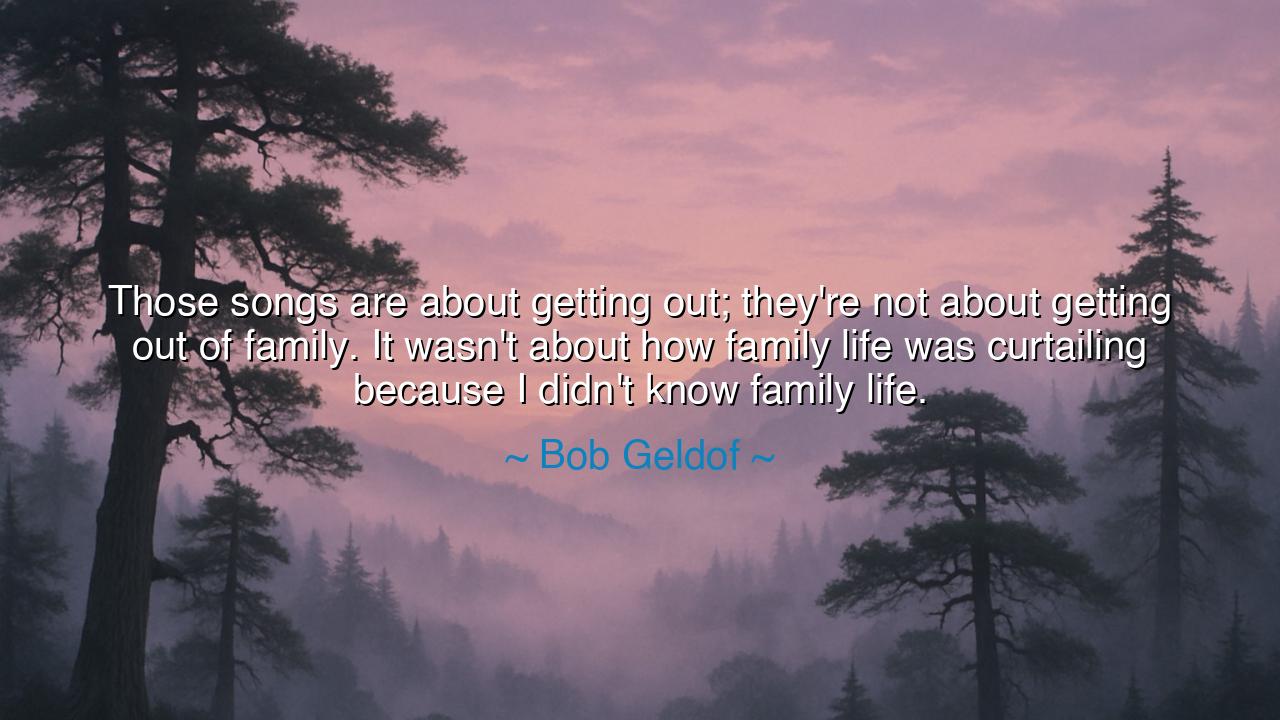
Those songs are about getting out; they're not about getting out
Those songs are about getting out; they're not about getting out of family. It wasn't about how family life was curtailing because I didn't know family life.






Host: The room feels calm, with the soft glow of the lamp casting a peaceful light across the space. Outside, the evening is settling in, and the world is quiet. Jeeny sits on the couch, her legs tucked beneath her, a cup of tea resting in her hands, her expression thoughtful. Jack, standing near the window, looks out at the darkening world, clearly deep in contemplation. The calm atmosphere feels perfect for a reflective conversation about family, freedom, and artistic expression.
Jeeny: “Jack, I came across a quote from Bob Geldof today that really struck me,” she says softly. “He said, ‘Those songs are about getting out; they’re not about getting out of family. It wasn’t about how family life was curtailing because I didn’t know family life.’ What do you think about that?”
Jack: He turns slowly, his brow furrowing as he processes her words. “That’s interesting. It sounds like Geldof is talking about the theme of escape or freedom in his music, but in a very specific context. He’s saying his songs were never really about rejecting family life — because it wasn’t something he knew or experienced in the way others might. It’s almost like he’s acknowledging that his music was about breaking out of something else, not necessarily the family structure, but something more personal or societal.”
Jeeny: “Exactly. Geldof seems to be clarifying that his desire for escape in his music wasn’t tied to family life itself, but rather to the larger feeling of wanting freedom or autonomy. He didn’t grow up in an environment where family life was something to rebel against. His songs were more about breaking free from the constraints of the world around him, not from the family unit, which he didn’t know in the traditional sense.”
Host: The light in the room seems to deepen, as if the conversation is uncovering something more profound about the relationship between personal experience and artistic expression. Jeeny speaks with an understanding that Geldof’s music reflects a desire for something broader than just family life — a yearning for independence, self-definition, and the freedom to choose one’s path. Jack stands still for a moment, reflecting on how often we interpret songs and art through the lens of our own experiences, but sometimes the message is more complex.
Jack: “So, in a way, his songs aren’t a rejection of family, but more of a desire to define his own identity outside of any expectations or norms. He’s not rejecting family life itself; he’s rejecting the limitations that might come with the expectations placed on him, or on others, by society. He wants to break free from the idea that freedom only comes by leaving something behind.”
Jeeny: “Exactly. His songs were about getting out, but not necessarily getting out of family. It’s more about escaping the expectations or boundaries that come with being part of a certain world. His music was about finding his own voice and space to exist, free from the conventional structures he felt confined by. It wasn’t a rebellion against family itself, but a desire for a different kind of life, one that wasn’t shaped by traditional norms.”
Host: The conversation feels quieter now, the weight of their words settling in. Jeeny and Jack reflect on how the desire for freedom and escape in Bob Geldof’s music was more about finding a space for personal expression than rejecting familial bonds. The idea that Geldof’s music speaks to a desire for independence — not from family, but from the societal structures that limit personal growth — resonates in a deeper way.
Jack: “It’s interesting how our interpretations of music can often reflect our own life experiences. Geldof’s desire for freedom wasn’t about rejecting family, but about escaping the boundaries of what was expected of him. It makes me think about how we often assume rebellion has to be against family or tradition, but maybe it’s really about creating something new for ourselves.”
Jeeny: “Exactly. Sometimes the rebellion is about creating a new identity for yourself, outside of societal norms, even if those norms are tied to family life. It’s not about discarding everything you know, but about finding a way to carve your own path in the world, even if it doesn’t fit into the traditional mold.”
Host: The room feels still, and the conversation lingers on the idea that the desire for escape or freedom in art doesn’t always equate to rejecting family or tradition. Sometimes it’s about seeking space for personal growth, self-expression, and independence from the expectations that shape our lives. Bob Geldof’s words serve as a reminder that the need for freedom in music, and in life, can be about discovering who we are beyond what’s expected of us, not necessarily about breaking away from the core bonds of family.






AAdministratorAdministrator
Welcome, honored guests. Please leave a comment, we will respond soon